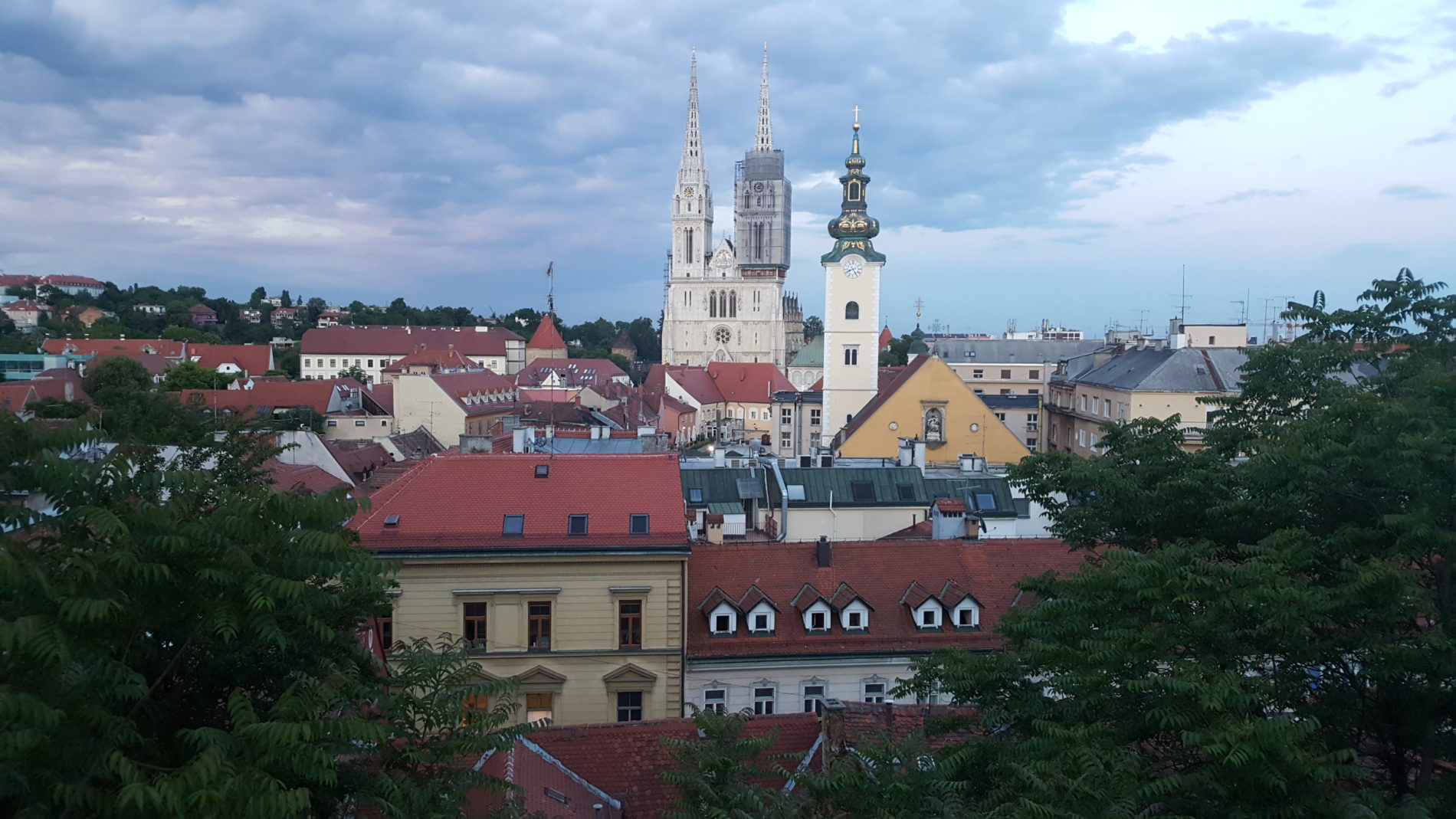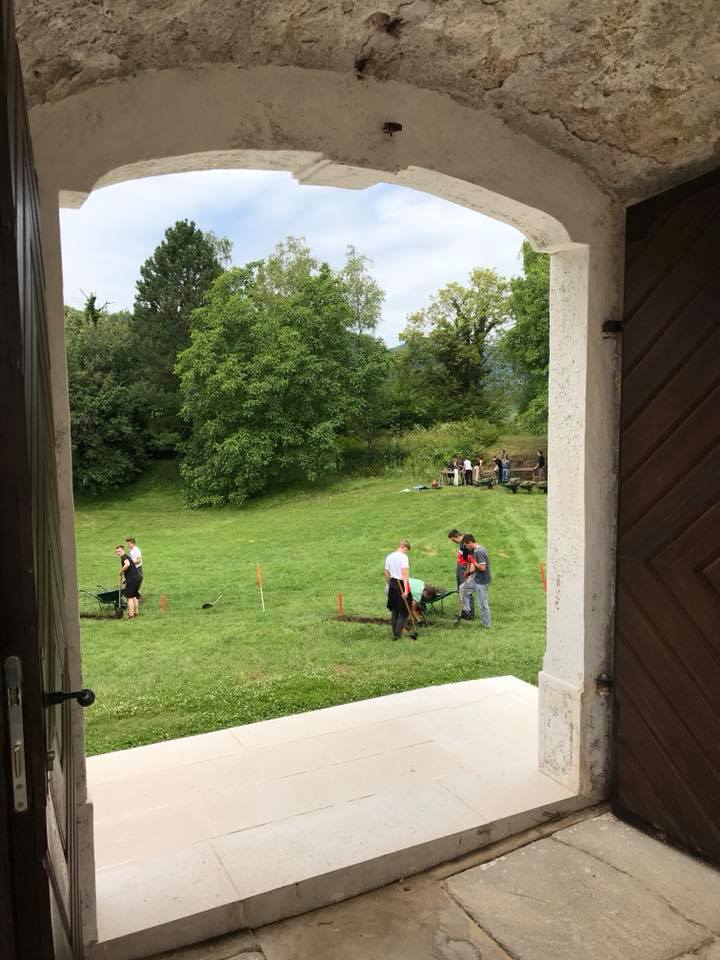All IFR field school applicants should familiarize themselves with IFR COVID-19 Practices before beginning the enrollment process. Program logistics are subject to change as health and risk management experts provide new recommendations and best practices. A Syllabus Addendum will be uploaded to each field school page and sent to all enrolled students with the latest logistical changes to their program.
Overview
Lobor is a sacred archaeological site that has been active since prehistoric times. It played an important role in Late Antiquity when various barbarian groups (Germanic and others) crossed the borders into the Western Roman Empire. In the period between the 4th and 7th centuries, settlements were relocated to hilltops so that they could provide better protection for the inhabitants and make visual communication between such elevated spots easier. At that time, a large early Christian basilica was built in Lobor. It was probably erected on the site of a former temple dedicated to Diana. After the early Christian church was destroyed, first a pre-Romanesque church and then a Romanesque church were built. These churches marked another important period in Lobor’s history, the Carolingian period. The remains of the only wooden church known so far in northwestern Croatia have been discovered at the site. The wooden church is likely to have served as a temporary shrine between the respective periods of activity of the pre-Romanesque church and the Romanesque church. Since the very beginnings, the Lobor site has been associated with female cults, first the goddess Diana and later the Virgin Mary. It has remained so until today.
The churches are surrounded by a cemetery with burials dating back to prehistoric times and up to the 19th century. Every year, research into one part of the cemetery is conducted. Students learn the process of determining the area of a burial, cleaning the skeletons in the soil, drawing, photography, dealing with in situ finds, removing and packing the bones, and laboratory analysis of skeletons. The Bioarchaeological School at Lobor began is 2016 as the Croatian Science Foundation project. The projects aims to reconstruct the profile of communities that lived in the area, from trauma analysis to DNA and facial reconstruction of individual skeletons.
Instructors
The directors welcome emails and inquiries about the research elements of this project. More general information (tuition, health insurance, and payment schedule) can be found under the ‘Students’ tab above. Any further questions may be addressed to IFR staff. Additional details about research, course schedule, travel, accommodation, and safety can be found on the syllabus. Contacting the directors or the IFR office is encouraged and appreciated. It may help you determine if this field school is a good fit for you.
Testimonials
Soon to be posted
Tuition Includes:
- Cost of Instruction
- Cost of Academic Credit Units
- Room & Board
- All Local Transportation
- Health and Evacuation Insurance
Student Fees
This program requires an online application — there is a $25 fee to submit an application. Once admitted, a payment of the nonrefundable deposit fee is required to secure a place in the program(s). The Tuition balance (total program cost minus the deposit fee) must be paid prior to the Tuition deadline as listed above under “Course Details.” A $200 late fee will be added to all accounts not paid in full by the Tuition deadline.
Deposit: A nonrefundable $500 deposit fee is required to secure a seat in the program. This deposit is part of the total Tuition and NOT in addition to it.
Late Enrollment (payment deadline forward): A nonrefundable $600 deposit fee is required to secure a seat in the program. In addition, a $200 late fee will be added to all accounts not paid in full by the Tuition payment deadline.
Withdrawal & Cancellation Policy: If you paid the deposit fee but did not cancel your participation by the Tuition payment deadline, you are legally responsible for the full Tuition regardless of attendance at any IFR program. Please carefully read our Withdrawal & Cancellation Policy for further information.
Credit Card Processing Fee: A 3.5% processing fee is automatically incurred for all credit/debit card/online payments.
Academic Credit Opt Out: Students who wish to participate in an IFR field school without earning academic credit units may do so and receive the following discounts: $300 off a full program (4 or more weeks in length) or $200 off a short program (2-3 weeks in length).
Trip Cancellation Insurance: Please consider purchasing a travel interruption insurance policy that will cover your travel cost and the cost of the IFR program once you make a commitment to attend a field school.
Accommodations
In Zagreb, students will either share a residence hall or a rented apartment. In Lobor, students will be housed at the Hunting Lodge in the foothills of the site. Getting daily to the work area and project facilities involves a 10 minutes walk uphill. The center of the village, where shops and bars can be found, is a 5 minutes walk from the lodge. The Hunting Lodge provides 3 – 6 persons bedrooms, two bathrooms with showers, three separate toilets, a kitchen, a common room with a fireplace and a large enclosed terrace.
A local restaurant provides two hot meals a day, which are chosen from their daily menus. Breakfast and dinner are self-served from provisions provided by the project. The field school can accommodate vegetarians, vegans, and students with gluten and lactose intolerance. Students with specific dietary needs should report their preferences in the field school application.


Travel Info
Please hold purchasing your airline ticket until six (6) weeks prior to departure date. Natural disasters, political changes, weather conditions and a range of other factors may require the cancellation of a field school. The IFR typically takes a close look at local conditions 6-7 weeks prior to program beginning and makes Go/No Go decisions by then. Such a time frame still allows the purchase of deeply discounted airline tickets while protecting students from potential loss of airline ticket costs if we decide to cancel a program.
On June 30, 2019, students will meet the project director Dr. Krešimir Filipec or his assistant Jana Škrgulja at the information desk/meeting point at the Dr. Franjo Tuđman Airport in Zagreb, from where they will be escorted directly to their accommodation in Zagreb and later to the site. The exact time of the meeting will be provided after the student confirm their flight bookings.
If you missed your connection or your flight is delayed, please call, text or email project director immediately. A local emergency cell phone number will be provided to all enrolled students.
VISA REQUIREMENTS
Citizens of the US, Canada, Japan, Republic of Korea, Australia and New Zealand do not need visa to visit Croatia for up to 90 days. All nationals who are holders of valid Schengen documents, as well as national visas and residence permits of Bulgaria, Cyprus, and Romania do not require an additional (Croatian) visa for Croatia. Citizens of other countries are asked to check the embassy website page at their home country for specific visa requirements. The Faculty of Humanities and Social Sciences at Zagreb University could send an official invitation letter that should be used at the relevant embassy to secure a visa to the program.
Student Safety
The IFR primary concern is with education. Traveling and conducting field research involve risk. Students interested in participating in IFR programs must weigh whether the potential risk is worth the value of education provided. While risk is inherent in everything we do, we do not take risk lightly. The IFR engages in intensive review of each field school location prior to approval. Once a program is accepted, the IFR reviews each program annually to make sure it complies with all our standards and policies, including student safety.
Students attending IFR international programs are covered by a comprehensive Health Insurance policy that includes physical illness or injury, mental or chronic conditions. No deductible and 100% of costs are covered up to $250,000. In addition, we provide Political and Natural Disaster Evacuation policy, which allow us to remove students from field school location if local conditions change. Our field school directors are scholars that know field school locations and cultures well and are plugged in into local communities and state institution structures.
Students attending IFR domestic programs (within the US) must have their own health insurance and provide proof upon enrollment. IFR field school directors are familiar with local authorities and if in need of evacuation, local emergency services and/or law enforcement will be notified and activated.
The IFR has strong, explicit and robust policy towards discrimination and harassment in the field. If students feel they cannot discuss personal safety issues with field school staff, the IFR operates an emergency hotline where students may contact IFR personnel directly.
Call (877-839-4374) or email (info@ifrglobal.org) if you have questions about the safety of any particular program.

















